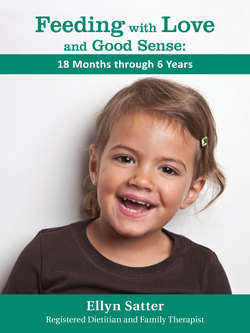Читать книгу Feeding with Love and Good Sense:18 Months through 6 Years - Ellyn Satter - Страница 7
На сайте Литреса книга снята с продажи.
Оглавление1. Raise a healthy child who is a joy to feed
Focus on how you feed and how your child behaves at mealtime, not on what your child eats. When you maintain the quality of your feeding relationship rather than worrying about what or how much your child eats, your child will eat and grow well and, sooner or later, he will learn to eat almost everything you eat. In the meantime, understand and expect normal child eating behavior. It is normal for your child to be a picky eater, to eat only one or two foods from any meal, to eat a food one time and ignore it another, to eat a lot one time and not much another, and to not eat vegetables.
You can make up for past feeding mistakes
If your child is not a competent eater, do not despair. Follow the guidelines in this booklet and all will be well. She is still very young, and when you change your ways with feeding and keep them changed, she will change her ways with eating.
Your child is a competent eater when . . .
He feels good about eating. He enjoys food and joins in happily with family meals and snacks.
He enjoys meals and behaves nicely at mealtime. He feels good about being included in family meals and does his part to make mealtime pleasant. He does not make a fuss.
He picks and chooses from food you eat with only minor chewing/swallowing/seasoning changes. He is okay with being offered food he has never seen before. He ignores food he does not want and also “sneaks up” on new food and learns to like it. Eventually he will learn to eat almost everything you do.
He eats as much or as little as he needs. Only he knows how much that is. Trusting him to eat as much he needs lets him grow consistently and develop the body that nature intended for him.
Do your jobs with feeding and let your child do her jobs with eating
Follow the division of responsibility. You do the what, when and where of feeding and trust your child to do the how much and whether of eating.
Trust your child to grow in the way that is right for her.
Understand your child’s development. Feed—and parent—in the way that is right for each stage.
Solve feeding problems by applying what you have learned in this booklet.
Your child will be healthy and grow well
When you follow the division of responsibility and your child feels good about eating, she will eat as much as she needs, grow in the way that is right for her, and, over time, learn to eat a variety of food. You may feel, however, that it is your job to “get in” nutritious food or get your child to eat a certain amount and grow in a certain way. By comparison, following the division of responsibility may seem like doing nothing at all. In reality, keeping up the day-in-and-day-out of pleasant and rewarding family meals and sit-down snacks is doing a tremendous amount. Parents say that following the division of responsibility works.
The division of responsibility applies to your special child
Every child is unusual in some way. The division of responsibility applies to all children and applies to children of all ages, birth through adolescence. The problem is that some children’s characteristics and behaviors make it seem that they can’t be trusted to do their part with eating. They can. With some children more than others, sticking to the division of responsibility demands steady nerves and a leap of faith. Here is help:
The child who won’t eat family meals.
The “too-small” child who seemingly doesn’t eat enough.
The “too-big child” who seemingly eats too much.
The picky eater.
The child who doesn’t eat vegetables or drink milk.
The child with special needs.
My toddler is a joy to feed
As a dietitian, I have studied Ellyn Satter’s books and watched the Feeding with Love and Good Sense Videos as well so that I can counsel parents. But only since I have had a child of my own have I fully realized the importance of the division of responsibility. My husband and I look forward to mealtime with our busy toddler. My son runs eagerly to the table when we call him and we all enjoy eating together. It is so much fun to watch him eat! We let him to eat whatever he wants in the meal and do not coax him to eat anything else. Our friends are amazed at how well he eats in general and how pleasant he is at the table. I am so thankful for the joy and relaxation we are able to experience at our family meals and I know it is due to the fact that we are following Ellyn Satter’s philosophy—we do our jobs and we let him do his.
